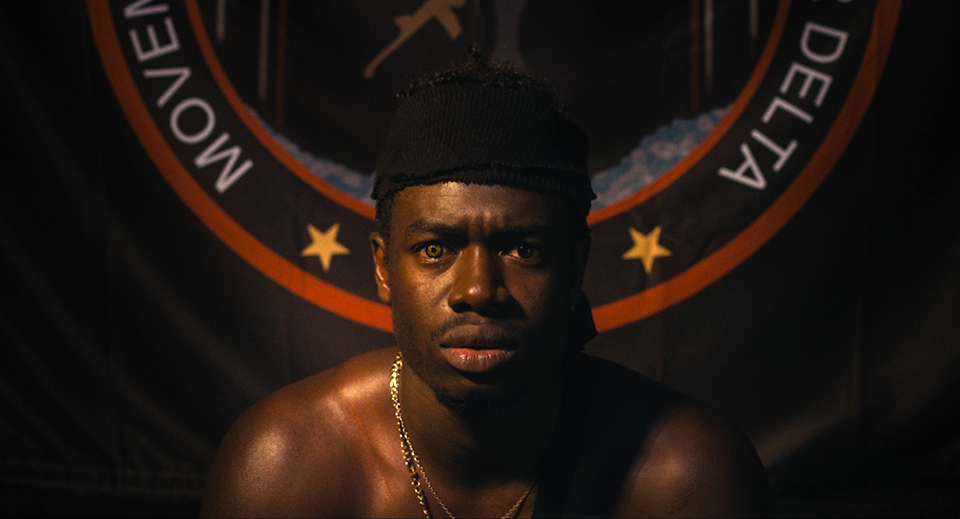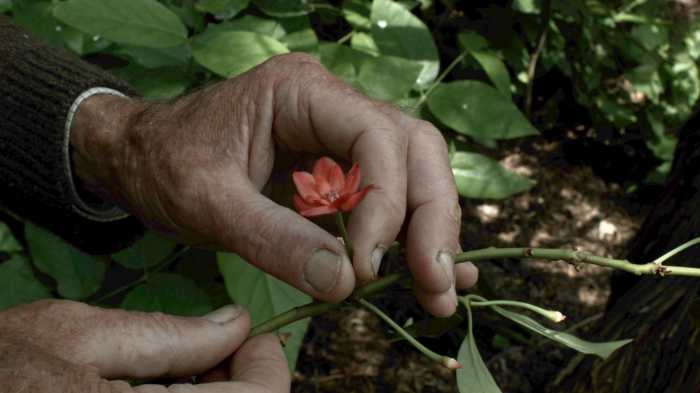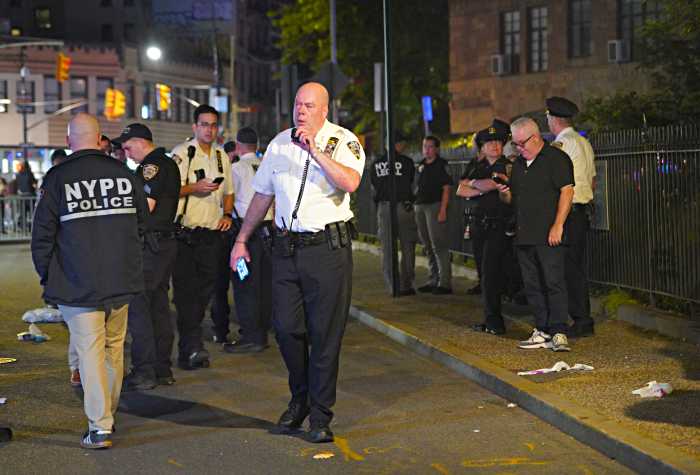“Disco Boy” is writer/director Giacomo Abbruzzese’s homoerotic and hypnotic character study. Belarusian Alex (Franz Rogowski) arrives illegally in Paris where he joins the French Foreign Legion as it promises a path to citizenship. Undergoing rigorous training, he is sent to the Niger Delta to save a group of French hostages captured by Jomo (Morr Ndiaye), the leader of MEND, the Movement for the Emancipation of the Niger Delta. Abbruzzese inventively shoots an encounter between Alex and Jomo using night vision that is striking. (The dynamic cinematography is by Hélène Louvart.)
Alex is haunted by what transpired in Africa, and back in Paris, he sees Jomo’s sister (Laetitia Ky) at a nightclub and becomes obsessed with her. As “Disco Boy” shifts tones and focus, contrasting the camaraderie of the legionnaires with the Nigerians, Abbruzzese shows how these men, bound by duty, each seek a sense of power and belonging. Rogowski is mesmerizing as Alex, a man who feels adrift and struggles to process his emotions — after being trained not to think.
Abbruzzese spoke with Gay City News about his extraordinary film.
What prompted you to make a character study about Alex? He is leaving his past behind, struggling to survive in the present, and haunted by what he experiences. What inspired this narrative journey of identity and trauma?
I met a dancer performing in a nightclub in southern Italy who had been a soldier. I was intrigued by someone who can train his body as a dancer and as a soldier. There are some common points in those universes — a sense of choreography, and a sense of discipline, and be destroyed physically at the end of the day. This was the starting point for the character who goes through this metamorphosis. In addition, a while ago, I was presenting a short abstract film about eco-terrorists who blow up a steelwork in Italy. I met guys who invited me to go to Belarus. I went and met many people who had friends who went to the foreign legion and never came back. Some of those guys were concretely fantasizing to go to France to go into the Foreign Legion to get a passport.
Those two events inspired me for Alex and his trip. I didn’t want to create cause and effect. I did not want an easy empathy. I wanted the viewer to imagine things. I have moved to different cities and countries, and this nomadism is a part of me. I felt I could have a view that is close to experiencing this kind of foreignness. I felt as a foreigner in France, I had a duty to talk about this — the way the Western world uses foreigners for their own interests.
The film is all about borders — emotional ones as well as physical ones. Can you discuss the themes of crossing and defending, nationality, and colonialism?
I tried not to portray either character as victims. They still dream of a better life. They are obliged to take weapons in different ways. Alex to enroll and Jomo to enter into an armed struggle. If I was Alex or Jomo, I would probably do the same. It’s a matter of where you are born and what possibilities you have. This way, you cannot have an easy empathy because it is almost mercenary. Jomo is resistant, or an eco-terrorist. I wanted to focus on those characters because the people at the front in wars are the last ones we care about. The victims are often the ones we care about first. Some [soldiers] don’t have a choice and end up fighting a war and have to take orders.
Can you describe how you captured the rhythm and textures of both Alex and Jomo’s worlds and why you juxtaposed them?
It was important that it was a war film where you see both sides. The worst thing to have to go through is to have to kill someone you don’t know anything about. I wanted to tell the story from this perspective and investigate this moral dilemma. We know well that the winners write the history. But there is a missing part of the story that helps complete the story and understand why conflicts happen, and if we don’t understand why conflicts happen, we cannot solve them. In the storytelling of war, everyone believes to be on the right side. You have to “dance” with your enemy to create the possibility of a new world and see the world through the eyes of another.
The film includes a remarkable sequence where Alex and Jomo fight that is shot in infrared. The training sequences are mesmerizing. The images here communicate so much emotion. Can you talk about creating the film visuals?
Visual language is very important, and I like when text is more abstract and not totally realistic. You can say so much through images. My direction of actors is very physical. I could only work with Franz as a sculpture. We didn’t talk about the past of the character and his exact feeling at the time. It was more about how he will walk, sit, drink, and change through film. It has to be hypnotic. Franz has this body that is already telling you a story.
Let’s talk about bodies. The opening shot features soldiers lying together sleeping. Then there is a football team on a bus. There are sequences featuring men training in the French Foreign Legion. There are fights, showers, and dancing. Can you talk about how you filmed bodies and depicted masculinity in “Disco Boy?” It is at once very homoerotic and very homosocial.
This kind of environment creates those situations. You have this kind of friendship and feeling of creating a family especially in a context like the Foreign Legion. These people have no one else; they have to become a family. It’s a very strong connection. I am fascinated by human bodies, male or female. You can tell a lot about a character or a situation by the way you portray bodies. It is about creating a deepness and contradictions in these characters and use the cliché but question it — so you have soldiers sleeping and then men on the bus. These men both paint their faces, but in totally different contexts. The film is built with this broken symmetry.
“Disco Boy” features moments of magical realism, with sequences that may — or may not — be dreams. What observations do you have about the film’s ambiguities?
There are a lot of moments where people are sleeping and waking up. In many films, dreams are connotated in terms of color or sound that tell you, “This is a dream now.” There is no ambiguity. In reality, it doesn’t work like this. When you dream, you don’t always know you are dreaming, or you are not sure of what you are seeing. You can’t immediately categorize it. I’m opening doors and windows so the virtual can enter into the reality. There are no boundaries anymore. After all this drama about passport control and borders, I wanted things to open and circulate. You can see the film as the dream of Alex and Jomo and how they cross each other. Or you can see the film as Alex is a soldier with PTSD having visions. Or it is possible this is really happening. I want to create an ambiguity and put myself at the level of Alex or have viewers wonder if his just in his mind or is it just him who can see this. If it is too factual, or explained, viewers would ask the wrong questions. There are zones of mystery and the unknown. We experience things that we cannot translate in a Cartesian way. I want to investigate this. It’s also very cinematographic. The film is surprising to viewers — even when clichés are used, it brings you somewhere else.
“Disco Boy” | Directed by Giacomo Abbruzzese | Opening February 2 at the Quad Cinema | Distributed by Big World Pictures.



































